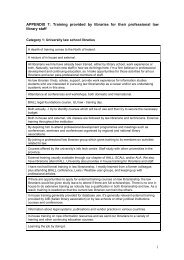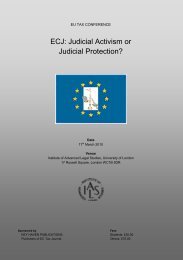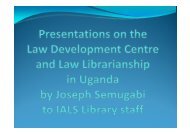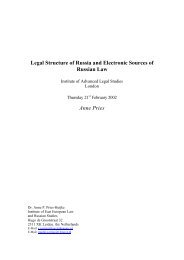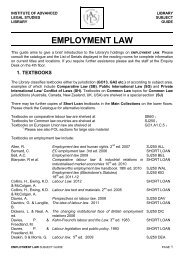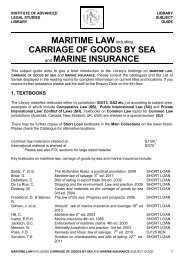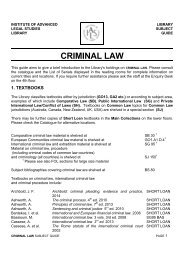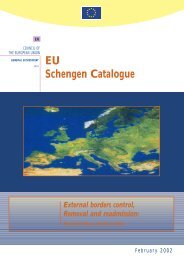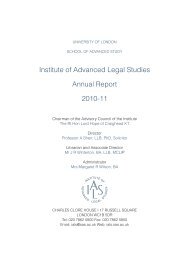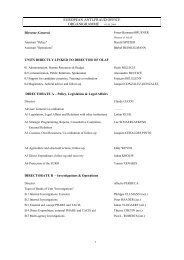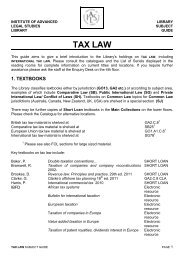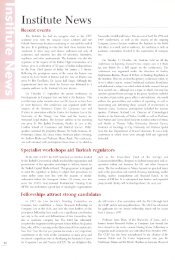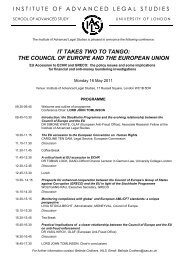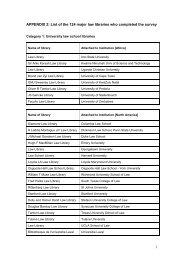a thesis - Institute of Advanced Legal Studies
a thesis - Institute of Advanced Legal Studies
a thesis - Institute of Advanced Legal Studies
You also want an ePaper? Increase the reach of your titles
YUMPU automatically turns print PDFs into web optimized ePapers that Google loves.
94 IMPLIED TRUSTS.<br />
law, though the former case can no doubt be explained on the<br />
ground <strong>of</strong> fraud. Apart from authority it is difficult to see why<br />
there should be any difference between personal property and<br />
land. Before the Statute <strong>of</strong> Uses, as Chief Baron Eyre pointed<br />
out in Dyer v. Dyer (infra], if a fe<strong>of</strong>fment were made without<br />
consideration, the use resulted to the fe<strong>of</strong>for. One would have<br />
thought, therefore, that after the statute there would have been a<br />
resulting trust on a voluntary conveyance " unto and to the use<br />
<strong>of</strong> " the grantee, and that this resulting trust would have been<br />
saved by sect. 8 <strong>of</strong> the Statute <strong>of</strong> Frauds.<br />
Whatever may be the true view as to this, it is clear that where<br />
a transfer <strong>of</strong> property is made to a wife or child, or one to whom<br />
the transferor stands in loco parent is, there is a presumption <strong>of</strong> the<br />
same kind that the transferor intended it as an advancement, just<br />
as in the case <strong>of</strong> a purchase in the name <strong>of</strong> such persons. (Lewin,<br />
Trusts, 10th ed. 156.) This appears to have been tacitly assumed<br />
in Say re v. Huglies, Foickcs v. Pascoe, Batstone v. Salter, and in<br />
Standing v. Boicring (supra) ; although with the exception <strong>of</strong> the<br />
somewhat vague case <strong>of</strong> Joinings v. Scllick (1687,1 Yern. 683), there<br />
was apparently no direct authority for it before the case <strong>of</strong> In re<br />
Orme (1884, 50 L. T. 51), where Kay, J., says, " Now I think it is<br />
quite clear by authority that if advances are made to a person to<br />
whom the individual who makes the advances is in loco parent is,<br />
that those advances are prtmd facie gifts," and decided that the<br />
money advanced in that case by a mother to her son for business<br />
purposes was a gift to the son.<br />
Illustrations.<br />
1. A widow transfers certain East India Stock which stands in<br />
her own name into the names <strong>of</strong> herself and her unmarried<br />
daughter. There is a presumption <strong>of</strong> intention to benefit the<br />
daughter, and in the absence <strong>of</strong> evidence the daughter is entitled<br />
on the death <strong>of</strong> her mother. Say re v. Hughes (1868), L. B,. 5 Eq.<br />
376.<br />
2. A., widow, makes small advances from time to time to her son<br />
B., to whom she is in loco parent is, to enable him to carry on<br />
business or for his maintenance. A. never attempts to recover<br />
these moneys, nor does she take any acknowledgment <strong>of</strong> them.<br />
After A.'s death B. cannot be charged with them in the admimstra-



